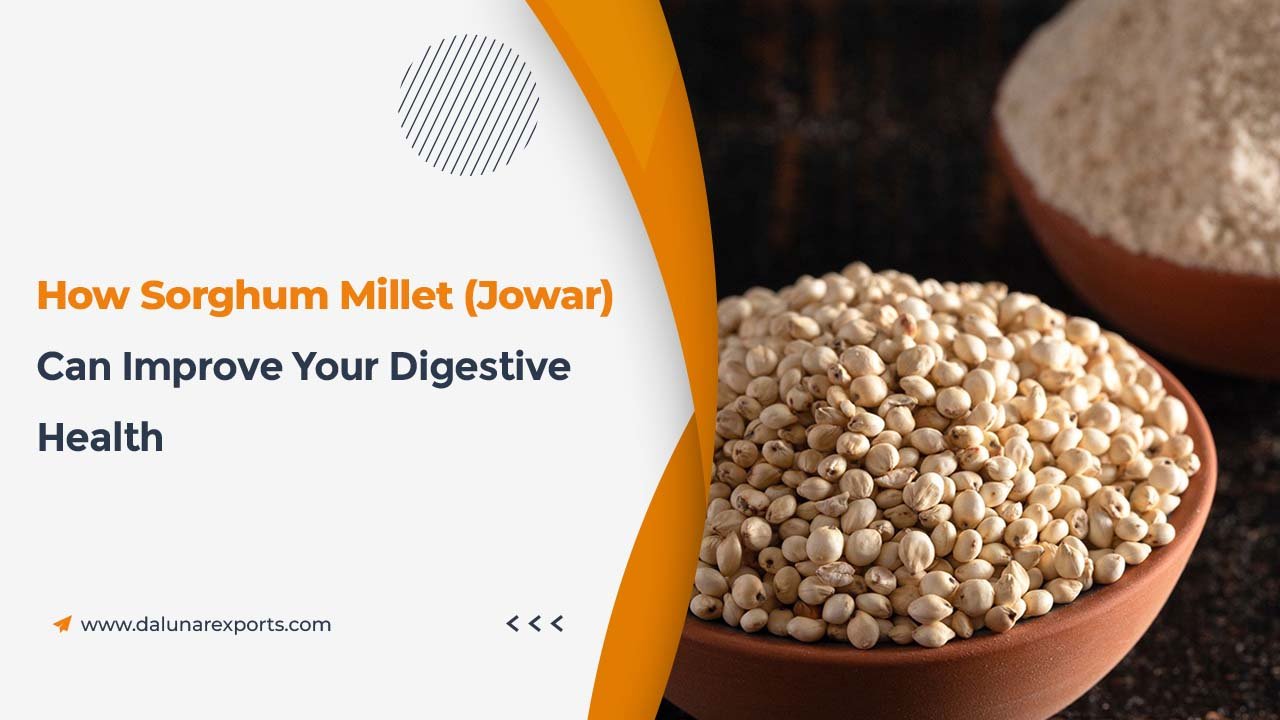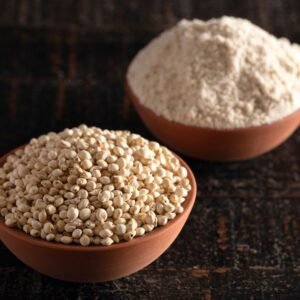
How Sorghum Millet (Jowar) Can Improve Your Digestive Health
One of the earliest grains to be grown worldwide is sorghum millet (Jowar), which is called Jowar in India. Often overlooked in favor of mainstays like rice and wheat, this unassuming millet is a nutritious powerhouse with many health advantages. Among its most significant benefits is its capacity to enhance digestive health. This article discusses its manufacturing in India, its rising popularity in the international export market, and how Jowar can improve the digestive system.
What is Sorghum Millet (Jowar)
A nutrient-dense, gluten-free grain, sorghum has long been a mainstay in many civilizations’ diets. It is a flexible and advantageous component for many diets because it contains vital nutrients like fiber, protein, vitamins, and minerals.
What Are Digestive Benefits Of Sorghum Millet
-
More Fiber Content
Sorghum millet’s high dietary fiber content is one of its most notable qualities. Over 10 grams of fiber, or more than 40% of the daily recommended intake, may be found in a single serving of Jowar. Fiber is essential for intestinal health since it:
- It encourages regular bowel motions.
- Provides the feces with more volume to avoid constipation.
- Promotes a balanced gut microbiota by providing nourishment for beneficial gut bacteria.
2. Gluten-Free Deliciousness
Jowar is an excellent substitute for wheat-based products for people with celiac disease or gluten intolerance. Because it is gluten-free, it doesn’t aggravate the digestive tract, which lessens symptoms like diarrhea, bloating, and discomfort in the abdomen.
3. Assists in Irritable Bowel Syndrome (IBS) Management
Jowar’s soluble fiber slows the digestive process, which helps control digestion. Abdominal pain and irregular bowel motions are two symptoms of IBS that this can help with.
4. Packed with Starch That Resists
Resistant starch, a kind of carbohydrate found in jowar, ferments in the colon and is challenging to digest in the small intestine. Beneficial short-chain fatty acids (SCFAs) are produced during this fermentation process, and they include:
- Bolstering the intestinal lining.
- Reducing the digestive tract’s irritation.
- Encouraging general gut health
5. Glycemic Index Low
Low-glycemic index (GI) foods help control blood sugar levels by gradually releasing glucose into the bloodstream. People with diabetes benefit most from Jowar’s low GI, which guarantees smooth digestion and lowers the chance of unexpected blood sugar increases.
6. Packed with Health Benefits
Jowar is abundant in phenolic chemicals, potent antioxidants that fight oxidative stress. These antioxidants promote intestinal health and general well-being by lowering inflammation.

How to Use Jowar or Pearl Millet in Your Daily Diet
Jowar is quite adaptable and can be eaten in several ways:
- Make rotis and pancakes from Jowar flour
- Use them as whole grains to cook rice or quinoa for soups, salads, or side dishes
- Consider puffed jowar as a healthy snack option seasoned with spices
- Eat Jowar Dosa or Idli as a fermented dish to enhance your digestive system.
Sorghum Millet Production in India and Its Exports
India ranks among the world’s top producers of sorghum millet. Jowar is a staple crop for farmers in low-rainfall areas. It is extremely drought-resistant and has historically been planted in semi-arid locations. Every year, India produces around 7 million metric tons of Jowar. The Indian government has encouraged millet production to increase food security and farmers’ incomes.
India has significantly exported sorghum millet worldwide, including countries from Africa, the Middle East, Europe, and North America. In 2023-24, India’s exports of sorghum millet were around 1.5 million metric tons, with around 2025 shipments of sorghum to 67 countries like USA, UAE, and Bangladesh. Indian Jowar is imported in large quantities by Gulf nations, especially Saudi Arabia and the United Arab Emirates, where it is utilized in traditional recipes and as animal feed.
Why Sorghum Millet is Highly Demanding
- The nutritional profile and quality of Indian sorghum are well-known.
- Indian millet is appealing in foreign markets due to its competitive pricing.
- Indian Jowar is utilized in the creation of biofuel, animal feed, and beer, which humans also consume.
Conclusion
Jowar, also known as sorghum millet, is a nutritious powerhouse with enormous advantages for digestive health and being a staple crop. It is essential for anyone trying to enhance their gut health because of its low glycemic index, high fiber content, and gluten-free status.
India’s significant contribution to the production of sorghum and its expanding export market underscores the significance of this ancient grain on a national and international level. By selecting Jowar, you’re supporting sustainable development and healthier decisions for yourself.
We at Dalunar Exports are delighted to locate and supply the highest-grade sorghum millet to international markets. Our dedication to sustainability, quality, and client satisfaction guarantees we can satisfy our clients’ varied needs. Make Dalunar Exports as your reliable partner whether you’re a company trying to get premium millet or a health-conscious person.
Tag Here

